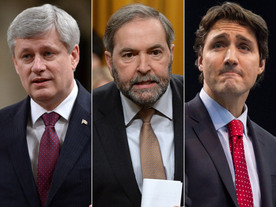
Regrettably, the media seems to have risen to the bait and, rather than decry this hijacking of the electoral process by one political party - in this case, the government - they have either focused on the tactical aspects of it or have used it as a forum to criticize the rigidity of the old system or, as apparently in the case of TVA, Maclean's and the Globe and Mail, have swallowed this tactic hook, line and sinker.
This is the time when the Canadian voting public has to stand up and say "enough is enough". In a society buffeted by the 24 news cycle and millions of dollars (public and private) in partisan advertising, the 90 minute, nationally shared experience of our political leaders going toe to toe on the issues, brings our choices as citizens into laser-like focus. Like the voting process, the leaders' debates should be free from partisan and media interference. It is time to hand the process over to Elections Canada and here are five reasons why:
1. No political party should have the power to dictate to media supplicants what the format should be or what platform should carry the broadcast. This is not about opening up the process, it is about shutting it down and keeping access under control. Our access to these debates must not be compromised by what broadcasters are willing to do in order to secure a contract;
2. The debates should stand-alone in their entirety and not be sliced and diced into video bytes to be used in partisan advertising. There is no question but that the genesis of this issue came when the broadcast consortium told the government last year that they would not allow their news broadcast footage to be taken out of context and used in partisan ads. The debates should fall into the same category and therefore could not be cherry-picked to misrepresent any candidate or party. By contrast, excerpts from debates receiving little national coverage could be edited to create a very different version of events and then plastered on the airwaves nationally;
3. The debates should be held within the writ period when there is a level playing field in terms of advertising and "spin" as to who said what. Early debates, with no control on the use of the video content, would be wide open to abuse by the parties with the biggest war chests - in this case primarily the government;
4. Nationally broadcast debates - television, radio, online - stimulate voter interest and engagement and result in more people turning out to vote. Fragmenting and marginalizing the debate process is a deliberate attempt at voter disengagement and vote suppression; and,
5. If we don't take a stand on this, then what is next? What if the government decided that Elections Canada could not be trusted to run the election and started to contract out for private vote counting firms? This might seem to be a bizarre notion, but two weeks ago so did the idea that the CPC would decide to hold their own boutique debates and turn their back on the national networks.
When the governing party can start to manipulate the electoral process to suit its own ends, we are seeing a major assault on democracy. "In and out", "Robo-calls", Peter Penashue, Dean Del Mastro, ignoring fixed election date laws, using public funds for partisan, vanity videos and 24/7 coverage of the PM, these are all actions of a government and party that has no respect for either parliamentary democracy or the electorate.
Are we willing to let them take us another step down this slippery slope?

 RSS Feed
RSS Feed